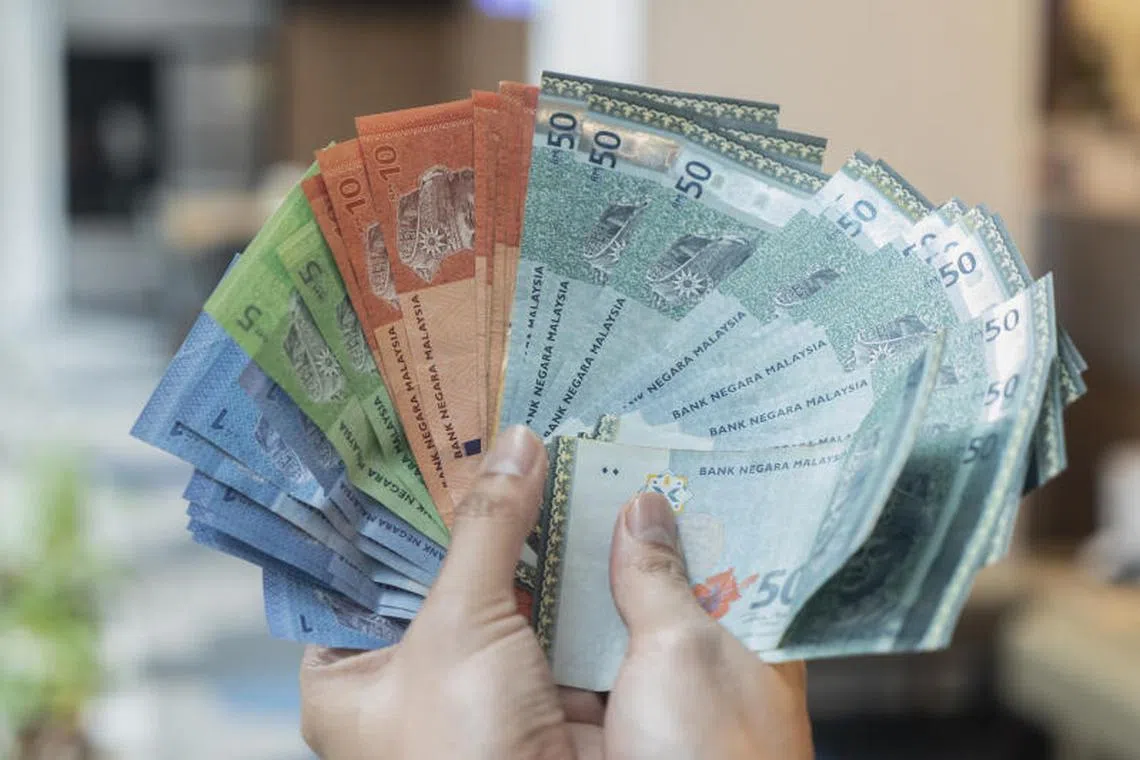Ringgit, stocks under pressure amid uncertainty as deadline extended to form Malaysian govt
Sign up now: Get ST's newsletters delivered to your inbox

The ringgit recouped most of its earlier losses against the Singapore dollar to trade at 3.3150, after weakening as much as 0.47 per cent to 3.332.
ST PHOTO: SHINTARO TAY
SINGAPORE - Malaysian stocks and the ringgit went through a volatile session on Monday after the King’s decision to grant rival party leaders a one-day extension
After diving sharply when trading opened – following a general election that delivered the nation’s first-ever hung Parliament
The benchmark Kuala Lumpur Composite Index slid 1.5 per cent to a session low of 1,427.75 before recovering to close at 1,447.96, down just 0.09 per cent.
The ringgit, which had tumbled almost 0.8 per cent to 4.5872 against the US dollar – its steepest drop in seven months – recovered more than half of its losses to trade at 4.575 at 5pm.
Against the Singapore dollar, the ringgit recouped most of its earlier losses to trade at 3.3150, after weakening as much as 0.47 per cent to 3.332.
Malaysian government bonds saw yields spike higher between three and 11 basis points during the day.
In the latest development, which came around noon, Sultan Abdullah Ahmad Shah gave party leaders and heads of coalitions a one-day extension of the deadline to propose their prime minister candidate. They have until 2pm on Tuesday to do so.
This comes after a surprise morning meeting between Pakatan Harapan (PH) chief Anwar Ibrahim and his Barisan Nasional (BN) counterpart Zahid Hamidi, which has yet to produce Malaysia’s next government, with Zahid saying his alliance’s supreme council has not decided who to back.
Despite the market recovery, appetite for Malaysian stocks remained generally weak amid uncertainty over the outcome of the talks.
Mr Sri Ram, a global strategist at a major Malaysian bank, expressed concern over the volatility in the equity, bond and currency markets.
“But having said that, the level of foreign participation is likely to be clearer in the next few weeks, especially if the winning coalition is able to ensure strong fiscal and monetary policy direction,” he said.
Malacca Securities said “sin” stocks such as gaming, alcohol and tobacco would lose if the Perikatan Nasional (PN) coalition – whose biggest component is the Islamist Parti Islam SeMalaysia (PAS) – manages to cobble together a coalition. The stocks of Genting, beermaker Heineken and Carlsberg Brewery were hit on Monday.
Maybank Securities said in a note to clients on Monday: “While investors were already braced for a hung Parliament scenario in the lead-up to GE15, the unexpectedly strong showing by the Islamist party PAS equates to a significant structural step-up in the uncertainty surrounding Malaysia’s political future and policy direction, regardless of which coalition prevails in forming the government.”
But Maybank added that East Malaysian construction and oil and gas plays may benefit if the region once again plays a “kingmaker” role in the new government.
To form a government, a party has to have a minimum of 112 parliamentary seats.
Datuk Seri Anwar’s PH
As at Sunday night, all indications were that PN had enough numbers, having attracted several East Malaysian parties, to form the government. Meanwhile, BN has 30 seats, enough to add to PH’s 82 to cobble together the magic number.
Until a clear sign emerges, the Kuala Lumpur market, also known as Bursa Malaysia, is likely to remain wobbly through much of this week as investors try to determine where things are headed in terms of economic and business policy, said analysts.
Mr Alexander Chia, head of regional equity research at RHB Bank, told Bloomberg: “This outcome constitutes a worst-case scenario for markets, with investor sentiment likely to remain clouded... depending on the duration of the power vacuum, the quality of the Cabinet members, and the parliamentary majority of the eventual government that will determine its ability to institute reform.”



